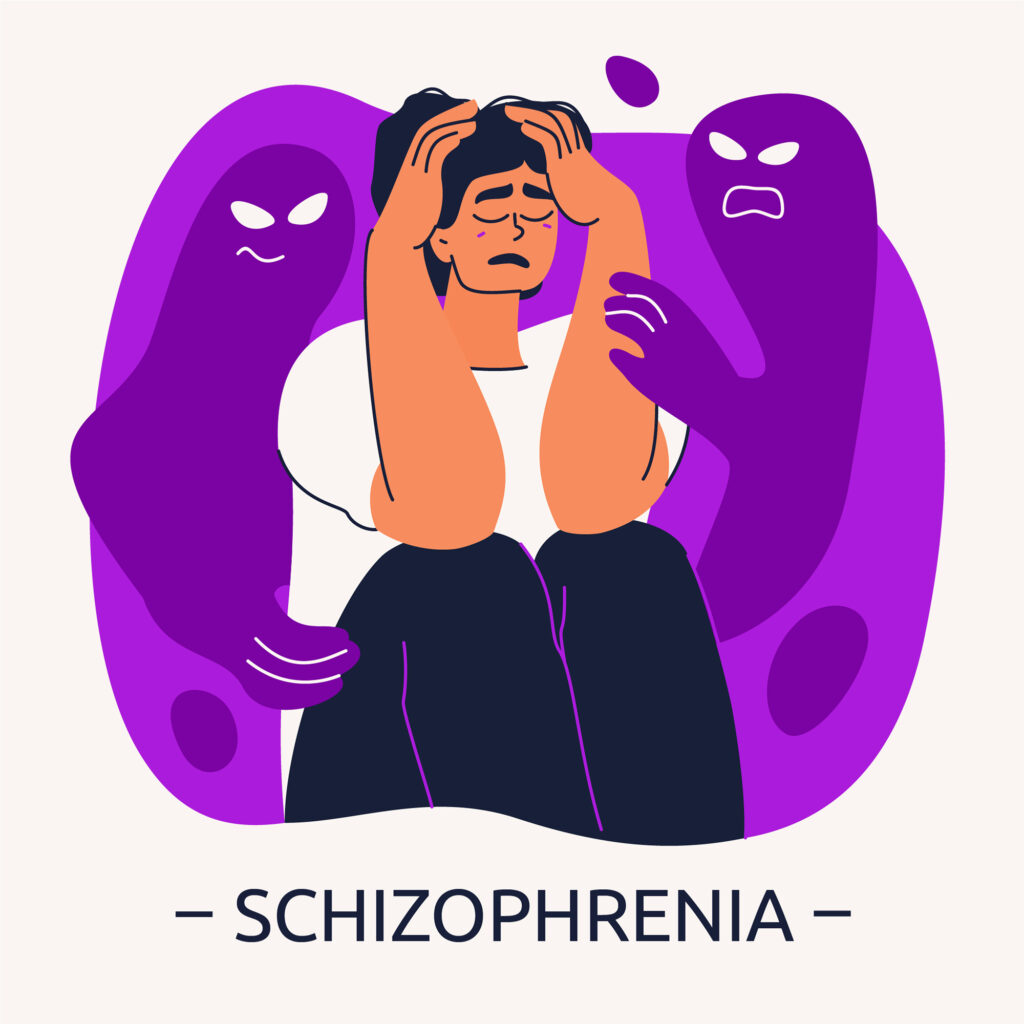Abhivritiprakash
psychotherapy & counseling clinic
Schizophrenia is a chronic and severe mental disorder that profoundly affects a person’s thinking, emotions, and behavior. It is characterized by a range of symptoms that can significantly impact an individual’s daily functioning, social relationships, and overall quality of life. Schizophrenia often emerges in late adolescence or early adulthood, but it can affect people of any age.
Positive Symptoms: These are symptoms that represent an excess or distortion of normal functioning. They can include hallucinations (false sensory perceptions, often auditory), delusions (false beliefs), disorganized thinking (speech that is difficult to follow), and disorganized or abnormal motor behavior.
Negative Symptoms: Negative symptoms: involve a decrease or loss of normal functioning. Common negative symptoms of schizophrenia include reduced emotional expression (flat affect), reduced motivation and ability to experience pleasure (anhedonia), social withdrawal, and difficulty initiating and sustaining activities (avolition).
Cognitive Symptoms: Schizophrenia often impairs cognitive functions, leading to difficulties with attention, memory, and executive functions like planning and decision-making.
It’s important to understand that schizophrenia is a highly heterogeneous disorder, meaning that symptoms can vary greatly among individuals. Not everyone with schizophrenia will experience all the symptoms mentioned above, and the severity and combination of symptoms can differ from person to person.
The exact cause of schizophrenia is not fully understood, but it is believed to result from a combination of genetic, environmental, and neurobiological factors. Factors such as a family history of schizophrenia, exposure to prenatal stressors, and imbalances in brain chemicals (neurotransmitters) are thought to contribute to the development of the disorder.

Antipsychotic Medications: These drugs help alleviate the positive symptoms of schizophrenia, such as hallucinations and delusions.
Psychosocial Therapies: Various forms of therapy, such as cognitive-behavioral therapy (CBT) and social skills training, can help individuals with schizophrenia manage symptoms, improve social functioning, and enhance daily living skills.
Rehabilitation and Supportive Services: These services can help individuals with schizophrenia improve their daily functioning, including vocational and educational support, housing assistance, and social services.
Family Education and Support: Involving family members in the treatment process can improve outcomes and help them better understand and support their loved one with schizophrenia.
While schizophrenia is a challenging condition that can have a significant impact on an individual’s life, with appropriate treatment and support, many people with schizophrenia can manage their symptoms, lead fulfilling lives, and achieve their goals. Early intervention and ongoing care are essential components of successful schizophrenia management.
Evidence-Based Treatment: The best clinical psychologists in Delhi for schizophrenia treatment use evidence-based therapeutic approaches to address symptoms effectively. These approaches are tailored to the individual’s needs and may include cognitive-behavioral therapy (CBT), family therapy, and psychosocial interventions.
Medication Management: Clinical psychologists often work collaboratively with psychiatrists to manage medication regimens for individuals with schizophrenia. This teamwork ensures a holistic approach to treatment, addressing both psychological and pharmacological aspects.
Holistic Care: Schizophrenia treatment encompasses not only symptom management but also support for daily living, including social skills, vocational training, and community integration. The best clinical psychologists recognize the importance of holistic care and often collaborate with other professionals to provide comprehensive support.
Crisis Intervention: Individuals with schizophrenia may experience crises or acute symptoms that require immediate attention. Clinical psychologists are trained to provide crisis intervention and help individuals and families navigate these challenging situations.
Recovery-Oriented Approach: The best clinical psychologists adopt a recovery-oriented approach, focusing on helping individuals with schizophrenia achieve their goals, regain independence, and improve their quality of life.
Community Resources: Clinical psychologists are often well-connected to local mental health resources and support services, helping individuals with schizophrenia access housing, vocational training, and community-based programs.
Stigma Reduction: Clinical psychologists play a vital role in reducing the stigma associated with schizophrenia and mental health issues in general. Their advocacy and education efforts contribute to a more understanding and supportive society.
Long-Term Support: Schizophrenia is a chronic condition, and individuals may require ongoing support. The best clinical psychologists in Delhi are committed to providing long-term care and monitoring to ensure that individuals with schizophrenia maintain stability and well-being.